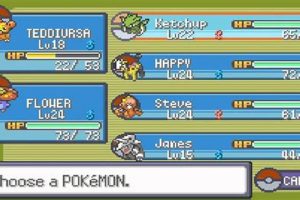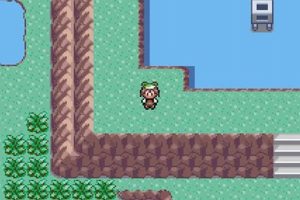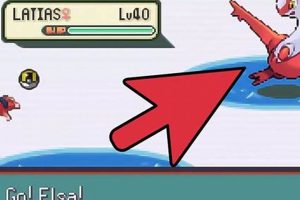Lexical anomalies, deliberate misspellings, and unexpected textual occurrences within the Game Boy Advance title, Pokmon Emerald, contribute to the game’s enduring appeal. These humorous linguistic features, sometimes stemming from translation quirks or programming oversights, have been widely shared and discussed within the gaming community. A notable instance might involve an item description containing an unintentional, yet amusing, phrase.
The importance of these accidental comedic elements lies in their ability to foster a sense of community and lighthearted engagement with the game. They provide shared experiences and inside jokes, reinforcing player loyalty and encouraging the sharing of gameplay anecdotes. Historically, these types of errors have often become integral parts of a game’s legacy, transforming simple flaws into endearing characteristics.
The following discussion will delve deeper into specific instances of such humorous textual aberrations found in the aforementioned title, examining their potential origins and analyzing their reception by the player base. This exploration aims to illustrate how unintentional linguistic quirks can significantly shape a game’s overall perception and cultural impact.
This section offers guidance on how to identify, understand, and appreciate instances of unconventional language found within the Pokémon Emerald game. Recognizing these elements can enhance gameplay enjoyment and provide a unique perspective on the game’s development and localization.
Tip 1: Careful Observation of Item Descriptions: Scrutinize item descriptions. Translation errors or character limitations can result in unexpected phrasing, creating unintentional humor.
Tip 2: Examination of NPC Dialogue: Pay close attention to the dialogue of non-player characters. Text rendering issues or coding errors may lead to amusing misinterpretations or nonsensical statements.
Tip 3: Attention to Pokémon Names and Move Descriptions: Investigate the localization choices made for Pokémon names and attack descriptions. Cultural nuances and translation challenges can generate comical results.
Tip 4: Cross-Referencing with Original Japanese Text (Where Possible): If feasible, comparing the English text with the original Japanese version can shed light on the origins of translation-related anomalies and their intended meaning.
Tip 5: Sharing Discoveries with the Community: Document and share any identified humorous textual quirks with online Pokémon communities. Collaborative analysis and discussion can enrich the understanding and appreciation of these elements.
Tip 6: Understanding Technical Limitations: Acknowledge the technical constraints of the Game Boy Advance hardware. Limited memory and processing power may have contributed to instances of truncated text or unexpected character substitutions.
The capacity to identify and understand these linguistic quirks enhances the overall gaming experience. By appreciating the unintentional humor embedded within the game’s text, players can gain a deeper connection with Pokémon Emerald’s unique charm.
The concluding section will summarize the key aspects of this linguistic exploration and offer final thoughts on the enduring appeal of Pokémon Emerald.
1. Misspellings
Misspellings, as components of humorous textual elements within Pokémon Emerald, arise primarily from technical limitations and localization challenges inherent in the game’s development. The Game Boy Advance’s limited character display and memory constraints often necessitated abbreviations and unconventional word formations, resulting in unintentional comedic effects. For example, an item description might feature a shortened word that takes on an unintended meaning. Such instances are not intentional jokes, but rather byproducts of the hardware limitations and hasty localization efforts. The importance of misspellings lies in their contribution to the game’s unique character, transforming potential flaws into endearing quirks recognized and celebrated by players.
The practical significance of understanding these unintentional errors centers on recognizing the contextual realities of game development at the time. Examining misspellings offers insight into the compromises made during the localization process. These unintentional comedic elements became memes, fostering a sense of shared experience among players who discovered and discussed them. Further, the misspellings were, on some level, appreciated because they gave the game a certain unique personality, which is a practical, tangible element that enhances player loyalty.
In summary, misspellings in Pokémon Emerald, arising from hardware limitations and linguistic adaptation, transformed from potential errors into integral parts of the game’s identity. Understanding this connection highlights the complex interplay between technical constraints, cultural interpretation, and unintended humor in shaping a game’s enduring appeal. While modern games have largely overcome these limitations, the misspellings in Pokémon Emerald remain a testament to the resourcefulness and, often, amusing results of early game development.
2. Translation Errors
Translation errors represent a significant source of unintentional humor within Pokémon Emerald. The process of converting the original Japanese text into English introduced numerous opportunities for misinterpretations, awkward phrasing, and outright nonsensical statements, contributing directly to the memorable and often amusing textual oddities found throughout the game.
- Literal Interpretations
Direct, word-for-word translations of Japanese phrases can often result in grammatically incorrect or contextually inappropriate sentences in English. Japanese grammar and sentence structure differ considerably, and without careful adaptation, the translated text can sound unnatural and humorous. For instance, a polite phrase or honorific might be translated literally, resulting in an overly formal or stilted tone that clashes with the game’s overall lighthearted atmosphere.
- Cultural Misunderstandings
Certain Japanese idioms and cultural references lack direct equivalents in English. Attempting to translate these expressions directly can lead to bizarre or confusing statements that are funny simply because they are nonsensical. For example, a reference to a specific Japanese cultural event or belief, when rendered literally in English, may lose its original meaning and instead generate unintended amusement.
- Character Limitations and Truncation
The Game Boy Advance’s limited character display often forced translators to abbreviate words or truncate sentences. This can lead to humorous ambiguity or unintended double meanings. For example, a crucial word being cut off mid-sentence could drastically change the meaning and create an entirely new, often funny, interpretation. The combination of truncation and literal interpretation frequently amplifies the comedic effect.
- Inconsistent Terminology
Lack of consistent terminology usage during the translation process can create a disjointed and humorous effect. Different translators might use varying terms for the same item or concept, leading to confusion and amusement. This inconsistency contributes to the overall perception of the game’s localized text as being somewhat haphazard and unpredictable, further enhancing the comedic potential.
These translation-related idiosyncrasies, while unintended, have become a defining characteristic of Pokémon Emerald. They contribute significantly to the game’s charm and provide a unique source of amusement for players familiar with the title. These unintentional comedic elements, stemming from the complex process of cross-cultural adaptation, transform potential flaws into endearing qualities, solidifying the game’s memorable status.
3. Truncated Text
Truncated text, as a prevalent characteristic within Pokémon Emerald, significantly contributes to instances of unintended humor within the game. Limitations in display space and character count on the Game Boy Advance necessitate the abbreviation and shortening of words and phrases, resulting in humorous ambiguities and unintended meanings. These instances of shortened text inadvertently create funny linguistic anomalies.
- Item Name Abbreviations
Item names are frequently shortened to fit within the available display space. This abbreviation can result in humorous, nonsensical, or suggestive names. For example, a healing item abbreviated to “Sup” might lead to player interpretations beyond its intended function. These limitations can transform standard items into sources of amusement, demonstrating how technical constraints can yield unexpected comedic results.
- Dialogue Clipping
Non-player character (NPC) dialogue often suffers from text clipping due to character limits. This can lead to incomplete sentences or phrases that change the intended meaning. When a character is interrupted mid-sentence due to space constraints, the remaining text can create confusion or a humorous disconnect, altering the player’s perception of the NPC and the storyline. The resultant truncated dialogue often results in comedic and unexpected interactions.
- Move Description Limitations
Move descriptions for Pokémon attacks are another common area where truncated text is found. The limited space available for explaining move effects can result in vague or misleading descriptions. For example, a complex move might be described with an abbreviated explanation that oversimplifies or misrepresents its functionality. These short descriptions can lead to players misinterpreting the move’s effects, causing amusing, albeit unintentional, misunderstandings during gameplay.
- Name Input Restrictions
The character limit when naming the player character, rivals, or Pokémon is another contributing factor. Players are forced to be creative, which can unintentionally yield humorous or suggestive results. The restriction on character count can be overcome in different ways, such as writing a word, which leads to mispelled words and result to unintended meaning. The limitations often results to humorous naming options.
Truncated text, therefore, plays a crucial role in generating unintentional humor within Pokémon Emerald. The limited display capabilities of the Game Boy Advance, combined with localization constraints, result in abbreviations and clipped phrases that contribute significantly to the game’s unique and often humorous textual landscape. The humorous effects of truncated text becomes part of the “funny word pokemon emerald” term.
4. Inappropriate Juxtaposition
Inappropriate juxtaposition, in the context of Pokémon Emerald, refers to the unintended placement of words, phrases, or visual elements that clash incongruously, creating comedic or absurd effects. This phenomenon, a component of the “funny word pokemon emerald” concept, arises from a confluence of factors including translation errors, coding oversights, and the limited contextual awareness of early game development processes. The juxtaposition becomes humorous precisely because it violates expectations of logical flow and thematic consistency. For example, a dire warning about a dangerous wild Pokémon might be followed by a trainers nonchalant remark about enjoying the weather, creating an incongruous effect that is inherently funny. The impact is amplified by the game’s overall lighthearted tone, making these instances all the more noticeable and memorable.
The importance of inappropriate juxtaposition as a component of unintentional humor in Pokémon Emerald stems from its ability to disrupt the player’s expected experience. The game’s narrative flow is momentarily broken, forcing the player to acknowledge the absurdity of the situation. Practically, this understanding highlights the challenges of localization and quality assurance in early game development. Without robust contextual checks, such incongruities slip through, inadvertently enriching the game’s quirky charm. Consider a scenario where an item description detailing a highly specialized tool is immediately followed by a generic greeting from a shopkeeper. The abrupt shift in tone and subject matter produces a humorous effect solely due to the proximity of these disparate textual elements. The unintended comedic moments resulting from inappropriate juxtaposition became synonymous to “funny word pokemon emerald”.
In conclusion, the concept of inappropriate juxtaposition is integral to the “funny word pokemon emerald” lexicon. The phenomenon arises due to a combination of technical constraints, translation challenges, and a lack of stringent contextual review during the game’s development. These unintentional comedic moments have contributed to the game’s enduring appeal, transforming potential flaws into celebrated quirks. Recognizing and appreciating these instances fosters a deeper understanding of the game’s cultural impact and provides insight into the complexities of game localization.
5. Unexpected Syntax
Unexpected syntax within Pokémon Emerald, as a component of the “funny word pokemon emerald” phenomenon, refers to deviations from standard grammatical structures and word order that result in humorous or nonsensical phrasing. This often stems from translation discrepancies, programming errors, or the limitations of the Game Boy Advance’s text processing capabilities. Such syntactic anomalies contribute to the game’s unique, and often unintentionally comedic, textual landscape.
- Subject-Verb Disagreement
Instances of subject-verb disagreement, where singular subjects are paired with plural verbs or vice versa, can create grammatical errors that are inherently humorous. These errors often occur due to oversight during the localization process or programming errors that fail to account for grammatical rules. For example, a line of dialogue might state “The items is ready,” a clear violation of standard English grammar, adding a layer of unintentional comedy to the interaction. Subject-verb Disagreement directly contribute to “funny word pokemon emerald”.
- Misplaced Modifiers
Misplaced modifiers, where descriptive words or phrases are positioned awkwardly within a sentence, can alter the intended meaning and create comical ambiguity. These errors can occur when translators or programmers incorrectly position adverbs or adjective phrases, leading to sentences that are grammatically unsound and unintentionally humorous. An example would be, “Flying over the forest, the Pokémon was easily spotted.” Flying is improperly modifying Pokemon. These misplaced modifiers become funny examples of “funny word pokemon emerald.”
- Incorrect Pronoun Usage
Errors in pronoun usage, such as incorrect pronoun case or ambiguous pronoun references, can create confusion and amusement. When pronouns are used improperly, the intended subject or object of a sentence can become unclear, resulting in sentences that are difficult to understand or that inadvertently convey a different meaning. For instance, using “him” when “he” is grammatically correct in the subject position produces a noticeable error that adds to the humorous effect. This issue also creates new examples to “funny word pokemon emerald”.
- Awkward Word Order
Deviations from standard word order in English sentences can lead to unnatural and humorous phrasing. When words are arranged in an unusual or illogical sequence, the resulting sentences can sound stilted, confusing, or simply absurd. This often occurs due to direct translations from Japanese, where sentence structures differ significantly from English. An example could be, “Strong very, that Pokémon is,” which reverses the typical adjective-noun order and creates an intentionally comedic effect. Awkward Word Order became examples of “funny word pokemon emerald.”
These examples of unexpected syntax, while often unintentional, contribute significantly to the “funny word pokemon emerald” phenomenon. The grammatical errors and awkward phrasing create a sense of linguistic quirkiness that enhances the game’s overall charm and memorability. By recognizing and appreciating these syntactical anomalies, players gain a deeper understanding of the localization process and the unintended comedic effects that can arise from linguistic translation. In short, “funny word pokemon emerald” and Unexpected Syntax always intertwine.
Frequently Asked Questions Regarding Linguistic Anomalies in Pokémon Emerald
This section addresses common inquiries and clarifies misconceptions surrounding the prevalence of unusual textual elementsa phenomenon occasionally termed “funny word pokemon emerald”within the Game Boy Advance title, Pokémon Emerald.
Question 1: Are the instances of unusual language in Pokémon Emerald intentional comedic devices?
Answer: The preponderance of evidence suggests these instances are primarily unintentional. Factors such as translation limitations, character restrictions, and programming oversights likely contributed to the unconventional phrasing and occasional grammatical errors. While some may interpret these elements as humorous, their origin typically lies in technical constraints rather than deliberate comedic intent.
Question 2: Do these linguistic anomalies affect gameplay?
Answer: Generally, no. The core gameplay mechanics and narrative progression remain largely unaffected by these textual quirks. While some instances may lead to temporary confusion regarding item descriptions or move effects, they rarely present significant obstacles to completing the game. These linguistic deviations are largely cosmetic in nature.
Question 3: Is the Japanese version of Pokémon Emerald similarly affected by unusual language?
Answer: The original Japanese version is subject to its own set of linguistic nuances and potential ambiguities. However, the specific types of errors and unusual phrasing found in the localized English version are distinct, arising primarily from the translation and adaptation process.
Question 4: How did these linguistic anomalies become so widely recognized and discussed?
Answer: The emergence of online gaming communities and the widespread sharing of gameplay experiences via the internet significantly contributed to the recognition and discussion of these unusual textual elements. Players documented and disseminated screenshots and anecdotes, transforming what might have been considered minor flaws into celebrated quirks of the game.
Question 5: Did Nintendo ever address these linguistic peculiarities?
Answer: Nintendo did not issue any official statements or patches specifically addressing these linguistic anomalies in Pokémon Emerald. Given their largely cosmetic nature and their contribution to the game’s unique character, it is unlikely that addressing them was deemed a priority.
Question 6: Does the presence of these textual quirks diminish the quality of Pokémon Emerald?
Answer: The presence of these anomalies does not necessarily diminish the quality of the game. In many cases, they enhance its charm and contribute to its enduring appeal. These elements transform potential flaws into endearing characteristics, fostering a sense of community and shared experience among players.
In summary, the “funny word pokemon emerald” phenomenon represents a confluence of technical limitations, translation challenges, and community engagement that has shaped the perception and legacy of the game. These linguistic quirks, while unintentional, have become integral parts of Pokémon Emerald’s identity.
The next section will provide a comprehensive glossary of terms related to “funny word pokemon emerald” and its associated phenomena.
Concluding Remarks on Linguistic Peculiarities within Pokémon Emerald
The preceding exploration has detailed the multifaceted nature of linguistic anomalies present within Pokémon Emerald. This analysis, often referenced under the term “funny word pokemon emerald,” has examined the contributions of translation errors, truncated text, inappropriate juxtaposition, and unexpected syntax to the game’s unique textual landscape. These elements, while largely unintentional in origin, have collectively shaped player perceptions and contributed significantly to the title’s enduring appeal.
Further research into the localization processes and technical constraints of early Game Boy Advance development may provide additional insights into the specific origins and prevalence of these textual quirks. Continued examination of this phenomenon is encouraged to further explore the intersection of game development, cultural interpretation, and community engagement within the context of digital entertainment. The legacy of “funny word pokemon emerald” serves as a reminder of the complex interplay between intention and reception in shaping a game’s enduring impact.







